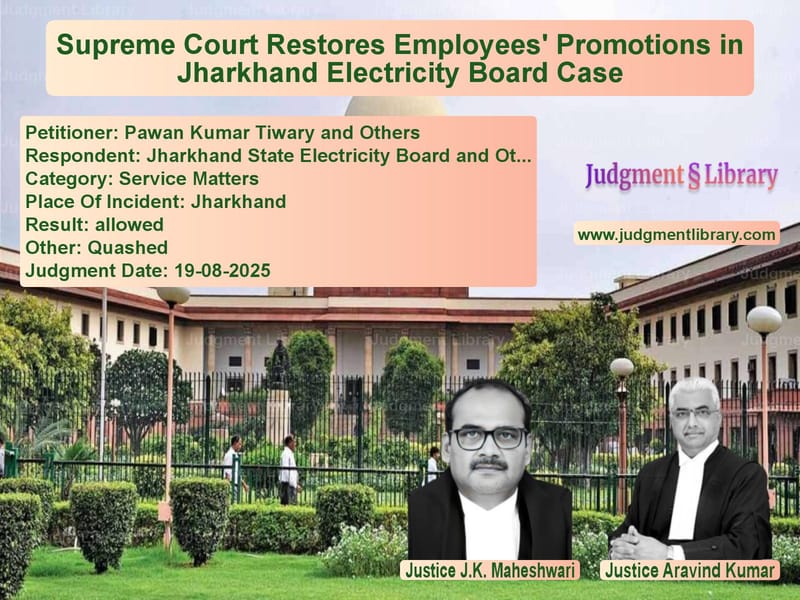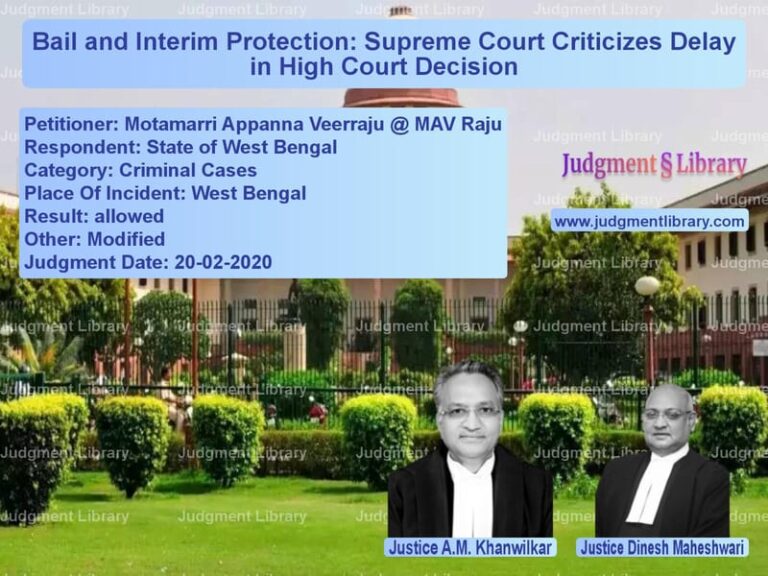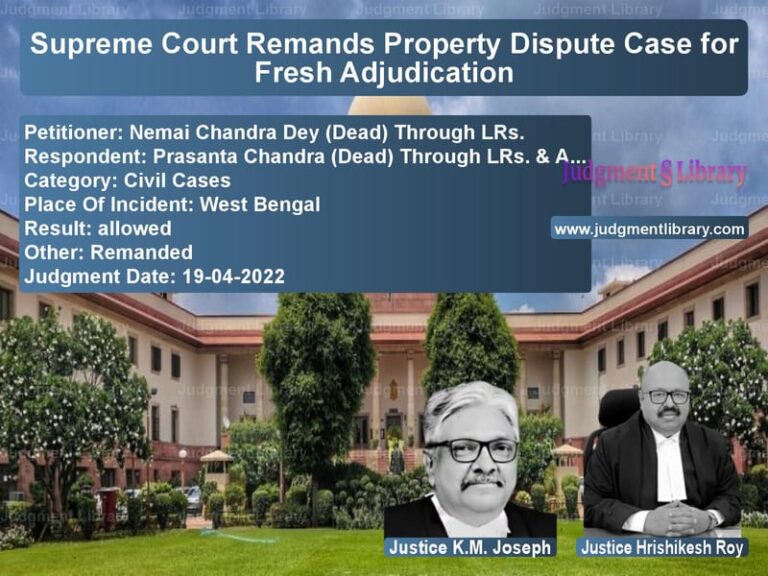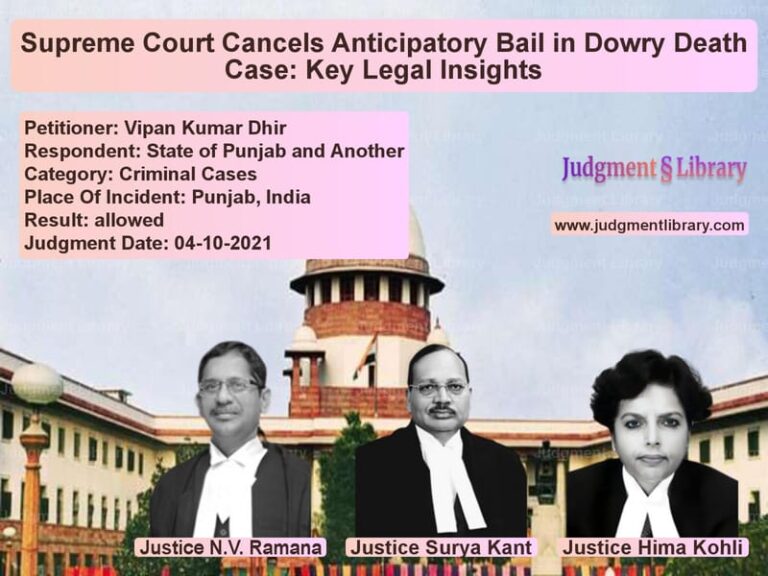Supreme Court Restores Employees’ Promotions in Jharkhand Electricity Board Case
In a landmark judgment that reinforces the rights of government employees against arbitrary administrative actions, the Supreme Court of India has restored the promotions of three employees of the Jharkhand State Electricity Board who had been fighting a legal battle for over 16 years. The court’s ruling, delivered on August 19, 2025, makes significant observations about the distinction between irregular and illegal appointments and emphasizes the importance of individual scrutiny in service matters.
The case involved Pawan Kumar Tiwary, Hemant Kumar Choubey, and Amar Kumar, who were appointed to Class IV posts in the Jharkhand State Electricity Board between 2004 and 2006. In 2008, the Board issued an internal advertisement for promotion to Class III posts, following which the appellants applied for positions of Routine Clerk and Lower Division Assistant. After successfully passing the required examinations, they were appointed to these positions on April 24, 2009, and began working in their new roles.
However, just weeks after their appointments, the Board issued an order on May 7, 2009, staying all internal appointments without providing any reasons. This was followed by the constitution of a three-member Enquiry Committee, which submitted its report on June 27, 2009, alleging that appointments were not made in adherence to prescribed rules and were beyond sanctioned vacancies. Based on this report, the Chairman of JSEB issued a directive on October 7, 2009, canceling all internal appointments and eventually, on July 22, 2010, the Board formally canceled the appellants’ appointments through Office Order No. 881.
The legal battle began when the appellants filed writ petitions in the Jharkhand High Court challenging the cancellation of their appointments. The Single Judge of the High Court partly allowed their petitions on August 14, 2018, quashing the cancellation orders and directing the Board to issue fresh appointment orders. However, the Single Judge denied them back wages and seniority benefits, treating their appointments as fresh rather than continuous.
Both parties appealed this decision – the Board challenged the direction for fresh appointments, while the appellants challenged the denial of consequential benefits. The Division Bench of the High Court, in its order dated December 22, 2021, allowed the Board’s appeal and dismissed the appellants’ appeal, setting aside their appointments entirely. The Division Bench held that even without any element of fraud, if the selection process suffers from unfairness and malpractice, the entire process must be canceled. The appellants’ review petitions were also dismissed on August 7, 2023, leading them to approach the Supreme Court.
During the Supreme Court hearings, the appellants’ counsel, Shri Gopal Shankarnarayanan and Shri Puneet Jain, presented several key arguments. They contended that the appointments of appellants Nos. 1 and 3 to Routine Clerk posts were not beyond the cadre strength, pointing out that the cadre strength was 23 posts, with 22 vacancies, and 50% (11 posts) were to be filled through internal advertisement. They emphasized that the appellants had fulfilled the two-year experience criteria and that the cancellation orders violated principles of natural justice as no notice or show cause was issued before cancellation.
Shri Puneet Jain, representing appellant No. 2, argued that for Lower Division Assistant posts, 5 posts were available as per rules, and approval was given for 25 posts by the Secretary due to extreme shortage, with the Chairman’s knowledge. He highlighted that 10% of the 51 vacant posts would amount to minimum 5 posts, which was within the cadre strength. Most poignantly, he noted that appellant No. 2 had attained the age of 50 years and had lost his eligibility to appear in any departmental examination, making this his last opportunity for promotion.
The respondents, represented by Shri Navaniti Prasad Singh, argued that the Division Bench’s findings confirmed in review did not call for interference and that no substantial question of law was raised in the appeals.
The Supreme Court, after thorough consideration, identified two main questions for determination: whether the Division Bench’s findings about the illegality of appointments warranted interference, and if the appointments were legal, whether the appellants were entitled to consequential benefits.
In its detailed analysis, the Court made several crucial observations that formed the foundation of its decision. The Court noted that the primary basis for the Division Bench setting aside the appointments was the conclusion that they were made beyond sanctioned strength, but found this conclusion factually incorrect and legally unsustainable.
The Court emphasized that the Enquiry Report itself recorded that appointments to the post of Routine Clerk were within the sanctioned strength. Specifically, out of 23 sanctioned posts, 22 were vacant, and internal recruitment was permitted for 50%, i.e., 11 posts. The appellants Pawan Kumar Tiwary and Amar Kumar were appointed within this quota. Similarly, for Hemant Kumar Choubey’s post of LDA, there were 51 vacancies, and the 10% quota allowed for at least 5 appointments, which were duly approved by the competent authority.
During oral arguments, when the Court demanded an explanation regarding this specific finding in the Enquiry Report, the learned Senior Counsel for the respondents fairly submitted that the appointments of the present appellants were within the prescribed sanctioned strength. This admission significantly influenced the Court’s decision.
The Court made a crucial distinction between irregular and illegal appointments, drawing from established jurisprudence. The Court observed that the Division Bench appears to have blurred the distinction between irregular and illegal appointments. In Vikas Pratap Singh (supra), this Court held that an appointment made without following every procedural formality may be irregular, but it does not become illegal unless it violates statutory provisions or is made without the existence of a post. This Court observed that if the appointment is to a sanctioned post, made by a competent authority, and not tainted by fraud or deceit, it cannot be labelled illegal merely due to some procedural lapse.
The Court further elaborated on this distinction, stating that an irregular appointment is one where procedure is not strictly followed but the appointee is otherwise qualified and the post is sanctioned. An illegal appointment, on the other hand, is void ab initio, such as where the appointee is ineligible or the post does not exist.
One of the most significant aspects of the judgment was the Court’s emphasis on the doctrine of severability and the need for individualized scrutiny. The Court stated that the doctrine of severability is not merely a tool of constitutional adjudication but a principle of fairness. In service law, it protects deserving employees from the fallout of administrative missteps not attributable to them.
The Court outlined specific requirements for such cases: When appointments of large numbers of persons are questioned, courts and authorities must: (i) Separate the legally sustainable from the unsustainable (ii) Apply the test of eligibility and sanctioned strength (iii) Assess whether there was fraud or misrepresentation (iv) Provide an opportunity of hearing before cancellation.
The Court strongly criticized the practice of mass cancellations without individual assessment, stating: There is also an urgent need to discourage the mechanical application of cancellation orders affecting large groups of appointees without differentiation. Service jurisprudence in India must evolve to reflect a nuanced, fact-specific approach that separates the legally sustainable appointments from those that are vitiated. It is neither just nor desirable to extinguish the careers of deserving employees merely for administrative convenience or to avoid the labour of segregation.
The Court also addressed the violation of natural justice principles, noting that the appellants’ dismissal without issuing a show cause or opportunity of hearing is a clear violation of principles of natural justice, and falls afoul of the law laid down in Maneka Gandhi v. Union of India and Another, wherein it was held that even an administrative order which involves civil consequences must be made consistently with the rules of natural justice.
While allowing the appeals and restoring the appointments, the Court also dealt with the question of consequential benefits. The Court held that while the appellants shall be entitled to continuity in service and restoration of seniority with effect from the date of their initial appointment on 24.04.2009, they shall not be entitled to arrears of salary for the period they were out of service. However, to protect their future service rights, they shall be granted notional fixation of pay and other consequential benefits subject to applicable rules such as increments and promotion eligibility.
The Court referenced the principles laid down in Union of India and Others v. K.V. Jankiraman and Others, where this Court held that seniority and other service benefits can be protected through notional fixation, even if back wages are not granted.
In its concluding remarks, the Court issued important guidance for future cases: We reiterate for future guidance that where multiple appointments are challenged on general grounds, authorities and courts must undertake a detailed fact-specific analysis before concluding that all such appointments are void. The doctrine of severability must not remain a mere theoretical doctrine but must guide real administrative action and judicial reasoning in service matters.
The Supreme Court’s judgment represents a significant reinforcement of employee rights and administrative fairness. By distinguishing between procedural irregularities and substantive illegalities, and emphasizing the need for individualized assessment rather than blanket cancellations, the Court has provided important safeguards for employees who often find themselves victim to administrative errors beyond their control. The ruling ensures that technical procedural lapses do not become grounds for destroying the careers of innocent employees who have legitimately earned their positions through proper selection processes.
Petitioner Name: Pawan Kumar Tiwary and Others.Respondent Name: Jharkhand State Electricity Board and Others.Judgment By: Justice J.K. Maheshwari, Justice Aravind Kumar.Place Of Incident: Jharkhand.Judgment Date: 19-08-2025.Result: allowed.
Don’t miss out on the full details! Download the complete judgment in PDF format below and gain valuable insights instantly!
Download Judgment: pawan-kumar-tiwary-a-vs-jharkhand-state-elec-supreme-court-of-india-judgment-dated-19-08-2025.pdf
Directly Download Judgment: Directly download this Judgment
See all petitions in Employment Disputes
See all petitions in Promotion Cases
See all petitions in Public Sector Employees
See all petitions in Termination Cases
See all petitions in Recruitment Policies
See all petitions in Judgment by J.K. Maheshwari
See all petitions in Judgment by Aravind Kumar
See all petitions in allowed
See all petitions in Quashed
See all petitions in supreme court of India judgments August 2025
See all petitions in 2025 judgments
See all posts in Service Matters Category
See all allowed petitions in Service Matters Category
See all Dismissed petitions in Service Matters Category
See all partially allowed petitions in Service Matters Category







